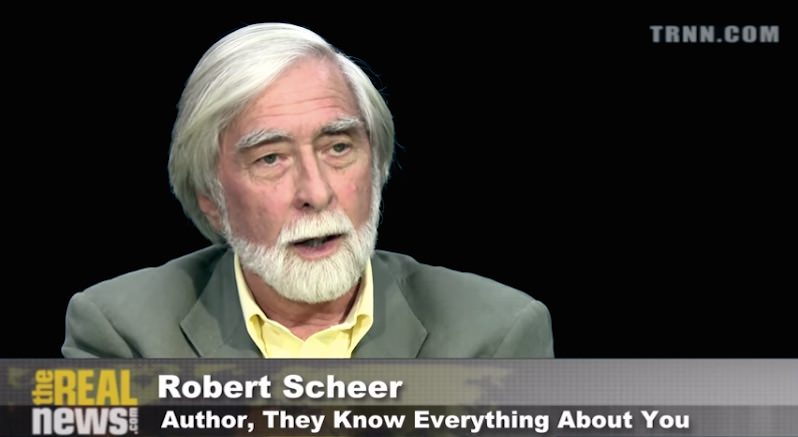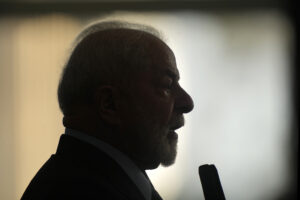VIDEO: Scheer and Hedges on Surveillance, Corporatism and the National Security State (Part 3/7)
Chris Hedges and Robert Scheer continue their conversation for The Real News Network about Scheer's latest book, "They Know Everything About You: How Data-Collecting Corporations and Snooping Government Agencies Are Destroying Democracy." In this segment, they discuss whether there is room for optimism vis-à-vis the surveillance of American citizens and the plunder of personal data by the fused corporate-political state.
Chris Hedges and Robert Scheer continue their discussion for The Real News Network about Scheer’s new book, “They Know Everything About You: How Data-Collecting Corporations and Snooping Government Agencies Are Destroying Democracy,” debating in this segment about whether there is room for any optimism vis-à-vis the surveillance of American citizens and the plunder of personal data by the fused corporate-political state.
Those who read Hedges’ columns on Truthdig might guess which side of that debate the activist and author takes up in this clip; whether Scheer is on the same page is up for discussion.
Watch the video above, via The Real News Network (transcript posted below).
Click here to see Part 1 of the interview, and here for Part 2.
–Posted by Kasia Anderson
CHRIS HEDGES, JOURNALIST AND AUTHOR: Hi. I’m Chris Hedges for The Real News.
Welcome to part three of my interview with Robert Scheer, the author of They Know Everything About You: How Data-Collecting Corporations and Snooping Government Agencies Are Destroying Democracy.
So let’s begin a little bit with the nature of totalitarianism. I would certainly argue that when government has the capacity to watch you 24 hours a day, then you can’t use the word liberty. That’s the relationship between a master and a slave. It doesn’t matter whether they use this power at the moment. They are certainly using it against people–Muslims, Occupy dissidents, environmental activists, and others. But they have that capacity now to use it against all of us should they decide to use it.
The storage of all of our personal information, this is the classic, or even the core definition of a totalitarian system, where you have the ability, should you decide to criminalize an entire group of people–we spoke about that in part two–as Hannah Arendt mentioned, to instantly sweep them up. And you in part two talked a little bit about a kind of innocent discussion about the Federal Reserve. That’s a kind of a very good example of how that happens.
I don’t share your optimism. I think that we’re already there. I think that at a moment of crisis, whether that’s environmental, whether that’s financial, whether that’s an act of catastrophic domestic terrorism such as 9/11, these people are totally ready to go.
And I would also want you to address a little bit, you know, at this point, is there really a difference between corporate and governmental power. I would argue that at this point they’re completely fused.
PROF. ROBERT SCHEER, JOURNALIST AND AUTHOR: Okay. So let me take the first part.
I think the founders of our country understood exactly what you said before and that any government, any government has the capacity to become coercive, destructive, in the extreme. And they were talking about themselves.
HEDGES: Right.
SCHEER: And we should remember that the people who frame this debate in the Constitution had once admired the monarchy in England because they thought it was tempered by the Magna Carta, it was tempered by common law, it was tempered by restraint. And yet they felt the wrath of this king when the colonies started to rebel. And they drew a very important lesson from it.
But they had already learned that lesson from the collapse of the Roman Republic; Athens to some degree, Greece; Spain; France. And they drew two basic points, I think. One is that you cannot be a republic and empire in the same moment, that if you are going to meddle in the affairs of people throughout the world, foreign entanglements and so forth, you can’t be a representative republic, that you will be lied to routinely in the name of patriotism. And George Washington, in his farewell address, a document I would commend to anyone to read, something he spent eight years thinking about because he was going to be a one-term president, and then he kept it in his drawer–and it wasn’t an address given, obviously, on radio or television, but was printed, and he consulted with Hamilton and Madison about it prior to his leaving after eight years. And it’s a very thoughtful document. And it first of all basically argues that if the decisions that you expect people to make politically in a republic are not close to home, if they don’t have information, if they’re not informed, then it’s not going to be a meaningful exercise, that the trick in representative government is not the vote itself, it’s how well informed the public is, so that those women in Iraq who held up their purple-stained fingers voting the way the ayatollah ordered them to vote, that’s obviously a parody of democracy. But so too is our current situation, where a fear of an enemy, whether it was communism, you know, it was a monolithic, inherently expansionist phenomenon, or terrorism, as an undifferentiated threat, unexamined, lied to, lied about weapons of mass destruction, and so forth, it makes this whole idea of a representative government a parody. It’s nonsense.
And you have to–so the assumption of the founders is you have–state of freedom is something that has to be nurtured. It’s fragile. People are not normally in a free situation. They were constructing a government and writing down rules for this government precisely ’cause they thought it would wither. Remember Jefferson’s idea? You’re going to need a revolution periodically to fertilize the tree of liberty.
HEDGES: Let me just throw in there, Bob, I mean, they also recognized the importance of the press, the Fourth Estate, as a vital counterweight. And through the security and surveillance apparatus, we have no mechanism anymore to investigate the centers of power. We cannot shine a light into the centers of power.SCHEER: Right. But because of that, a sense of a foreign threat, so we have to just deal with that first of all. And when they put in these freedoms, they didn’t put them in as a luxury, you know, something you could only have in the best of times when you have no enemy. On the contrary, they were in an incredibly vulnerable position themselves. They’d just come through a revolution. They knew the English could return. They knew they had other foreign enemies. And yet they enshrined these protections, not because freedom is a luxury in the best of times, but a necessity in the worst of times, that you will not have truth drive out error, you will not–you know, as Washington warned, the impostures of pretended patriotism–you will not be able to stop these very same folks–Washington, Madison, Hamilton–from being bad people if you don’t have the power of the people to check them. Okay. So that was absolutely critical to their whole evaluation.
The other is that people have to be given a zone of protection for their ideas and their effects. That’s what with the Fourth Amendment was about, that if you are just observed all the time, if you’re out there and can’t collect your thoughts, can’t think the unpopular thought, can’t read what you’re [incompr.] you will not be a free people. It’s the basic condition. And they understood or anticipated exactly what happened in Germany. You mentioned Hannah Arendt, who is famous for having talked about the banality of evil. And if I were to talk about the current situation in that historical context, we have reduced the exercise of representative government to the most banal. We argue, but usually on an uninformed basis–we don’t know what’s really being done in our name with drone strikes or invasions or the dictators that we support around the world. We’re lied to with impunity, you know, going back to the Vietnam War, the Gulf of Tonkin Resolution. I happened to write one of the first stories about it when they finally declassified a document showing there hadn’t ever been a second Gulf of Tonkin, and the government knew at the time, and the government lied to us at the time.
We recently, while I was writing this book, finally they declassed the smoking-gun document (the media didn’t even pay much attention to it) on the overthrow of Mohammed Mosaddegh in Iran in the early ’50s, and it clearly established it was done by our CIA at the behest of the British intelligence acting on the request from the Iranian, Anglo-Iranian Oil Company, which is now known as BP, and said, we have to get rid of this guy, Mosaddegh. We know he’s not an agent of the Russians, we know he’s not an enemy in any way, but he’s threatening to hurt our profit in the oil business.
But if you didn’t have that information, you thought, oh, there’s this dangerous guy in Iran, we’ve got to get rid of him, and then we get the Shah, and we’ve got to–you know, he’s having some problems, and then now we’ve got the ayatollah. Where did he come from? Where did madness come from? Where did chaos come from to the Mideast? Oh, well, maybe these are monsters of our own creation, and maybe we are the ones–.
HEDGES: Like ISIS.
SCHEER: Yeah, or like al-Qaeda to begin with. We recruited these maniacs to go fight a basically secular government that happened–or we thought was too cozy with the Soviets. So these are our monsters. Well, if you don’t have that information, the electoral process doesn’t mean anything. Then you add in the power of money to corrupt it and distort the agenda and manipulate and it becomes a charade.
So then you asked me before, how can I dare be optimistic? And the reason I’m optimistic is that, one, I think people throughout the world have embraced the notion of freedom and individual sovereignty and that there is pushback from so-called ordinary people. And we did see it with Occupy, we do see it in a revived labor movement in some ways. You know, we see it with immigrant groups, Latinos demanding their rights, undocumented people. But we see it all over the world. We saw it in the Arab Spring. We see that, you know, actually freedom, liberty are not abstractions. It’s a part of being alive. You are a person of the church. Your father was a minister. You–I think now you’re technically a minister.
HEDGES: Yes.
SCHEER: Right? So the whole notion that we all have a soul and that the soul is to be held accountable by an almighty, that the soul has to–decisions are made, that the soul can be sacrificed, that ethics and morality are something individuals have to struggle about. Well, the struggle in the eyes of an almighty don’t mean anything if we don’t have an informed decision, if we aren’t aware of what’s being done. You know, we go along with torture, we go along with oppression because we are lied to. You know. So these become real issues for people. What did I know? How do I know it?
And we have true heroes. Where do people like a Daniel Ellsberg, who gave us the Pentagon Papers, or Edward Snowden or Bill Binney, these people, absolute heroes, Jessica Lynch, who was pictured by the Defense Department as a Rambo fighting off the enemy, and then she wrote a book, a courageous book, in which she said, no, the government–our government manipulated me. Pat Tillman, the football player, you know, a great career, and his brother Kevin, who was a professional baseball player, they volunteer to fight al-Qaeda, and they go, and he’s killed by friendly fire, and the whole thing is lied about by the government. Well, my wife, Narda Zacchino, did a book with Mary Tillman, Pat Tillman’s mother, and Mary Tillman said, I’m not going to settle for your lies. My son was killed, and you tried to exploit him for propaganda purposes. He was killed with American bullets, not by this enemy. And she has for years tried to get to the truth of the matter.
So people push back. People embrace liberty. It turns out this may be the most normal condition of human beings, where they feel best. Okay? And that’s why even now, in this very manipulated and, you know, controlled society, we play with the images of freedom, through shopping, through choice, and so forth. We entertain people to death with free choices, what movie [crosstalk].HEDGES: Well, and the facade of our electoral system.
SCHEER: Yeah, that’s true. But the reason–aside from that, I think people do have a thirst for freedom and that this is worldwide. People do want to throw off the shackles of dictatorships. And we’ve covered totalitarian countries, the two of us, and we know the reason you have dissidents, the reason you have people rebel is they don’t want to be controlled. When I would visit the old Soviet Union, one of the healthy things about it is that I never met anyone, even if they were a loyal member of the Communist Party, who told them Pravda, which name means truth, told them the truth. They knew they were being controlled.
We have a different problem in our society is that this is all wrapped in the cover of freedom and so forth. So we are lied to in a much more effective way. We know that. Now, why am I optimistic? I’m optimistic because we live in a world in which capitalism has moved to a different stage and it no longer can be contained within the bounds of the nation. As long as we could have our big companies with–we are 6 percent of the world’s population, but we got 70 percent of the world’s resources, as long as we were the only ones who could make stuff and we could sell it internationally, we had a model of exploitation and sales and so forth where you could be loyal totally and under the subservience of your own government or in partnership with your own government and go ahead and rip off the rest of the world. That’s what the English did when they ripped off the oil of the Mideast. That’s what we did when we sold stuff all over the world and invaded countries with impunity.
But that’s not the model that we have anymore. The nationstate itself is an anachronism in the eyes of many people. And what we have are these multinational corporations that have gained credibility by pretending to be totally independent, free-form institutions. And so GE, which was once the most American of companies, and so the flag could be wrapped around it, no. Two out of three of GE’s jobs are abroad, most of their activities are abroad, and so forth. This was true, obviously, of the auto companies, most clear of the information companies, the Facebook and Apple and so forth. Their growth has to come internationally. This market is saturated. And they have to have–so in China, for instance, right now, three of the top ten information companies, internet, are Chinese. Now, how is Google going to penetrate that market? The Chinese government tries to keep them out, and they can say, hey, they’re agents of the NSA, they’re agents of the CIA. So they play the nationalism card. Google tries to say, no, you can trust us, we really care about the people we’re serving. Same with Apple, Facebook, Mozilla, Instagram, so forth. You have what somebody like Marx wrote about as a contradiction of capitalism. And you can’t be both. You can’t claim that, hey, we want to go into China and photograph all your houses and hire all your people and sell you all this stuff, and we can do it, it doesn’t matter that we’re an American company, we’re doing it for the interests of the Chinese people, our customers. And that’s true in India and that’s true in Brazil. Right? Oh, did we tap the phone of the elected leader of Brazil? Oh, did we tap the personal phone of the elected leader of Germany? Oh, did we interfere in your domestic politic? That wasn’t us. That was the NSA. Okay? That was the CIA. Oh, they were using our data. So, suddenly the cat was out of the bag. You know. This was the value of Edward Snowden, but it would have come out anyway. Ultimately it was coming out. And [incompr.] wait a minute, Google, Apple, Facebook, you guys are really not independent multinational companies. You’re actually old-fashioned agents of your own state government. You are in cahoots with them. You are wedded to them. They grab all this data. And therefore you’re spying on us. Why should we go with you? We’ll go with a domestic, we’ll go with the devil we know, a domestic company.
Right now the main pushback we’re getting are not from liberal Democratic politicians. You know, they’re not from people who claim they’re interested in privacy on that end. They’re coming from these multinational corporations. It’s irony. If you look at where a section of my book is reprinted, like on Salon or on Truthdig, there’ll be an ad from Google at the bottom. From Google. Not a Google AdSense ad selling you soap or something or a car, no, saying, we have to save the internet, we have to control the NSA.
HEDGES: You deal with that in a book.
SCHEER: Yes. But the interesting thing is this is real, because their business model is threatened by these disclosures. If it could have been kept secret, that’d be something else. But once it’s out and people around the world know–so your biggest challenge right now, if you’re sitting there at the top of Google, these enormously powerful, wealthy companies, you’re getting pushback from the European Union–.
HEDGES: But you believe them? Do you believe them?
SCHEER: Do I believe that they’re concerned? Yes.
HEDGES: Do you think that they will actually separate themselves from this security and surveillance apparatus?
SCHEER: Well, if they don’t, then they will decline.HEDGES: Well, I asked Binney once if he encrypted, and he started laughing, because I had been speaking back and forth through encryption through another country, and they would only speak to me through encryption, and I said, Bill, I think when I send an encrypted message, it’s probably read faster than another message. And he agreed. He said, I don’t encrypt. He said–. And Julian Assange has said the same thing in Cypherpunks, that he said in the short term, you can use mechanisms to stop them, but in the end we have created the most efficient mechanism to create a worldwide dystopia.
SCHEER: Well, first of all, let me disagree. And, actually, you should have Binney, and we’ll talk to him. But I think his position is a little different than–as I’ve indicated to you, I listened to him for the last four days. There’s two things. First of all, what they’re doing is not efficient if the goal is to stop terrorism or–.
HEDGES: It’s not the goal.
SCHEER: Yeah. Okay.
HEDGES: That’s not the goal.
SCHEER: But, I mean, if the goal is to really do targeted–.
HEDGES: But that’s not the goal. You know that’s not the goal.
SCHEER: Okay. I agree. Okay. But the other thing is, if your purpose is to–okay, so you’re going to accept it’s not to get the bad guys, it’s just to observe all of us, right, I’ll agree with that.
Okay. So let’s take that. That puts you in opposition to what these companies are doing. And I’ll give you a concrete example. Apple and Google and Facebook have all taken strong positions that they want to encrypt all of this mail.
HEDGES: Right.
SCHEER: Okay. Now, if your goal is to observe everything we’re doing and not just find some bad guys, that makes it maybe too expensive to do.
HEDGES: Thank you very much, Bob.
This is the end of part three of my interview with Robert Scheer, the author of They Know Everything About You: How Data-Collecting Corporations and Snooping Government Agencies Are Destroying Democracy.
I’m Chris Hedges for The Real News. And we’ll be back with part four of my conversation with Robert Scheer.
Thank you, Bob.
Your support matters…Independent journalism is under threat and overshadowed by heavily funded mainstream media.
You can help level the playing field. Become a member.
Your tax-deductible contribution keeps us digging beneath the headlines to give you thought-provoking, investigative reporting and analysis that unearths what's really happening- without compromise.
Give today to support our courageous, independent journalists.






You need to be a supporter to comment.
There are currently no responses to this article.
Be the first to respond.